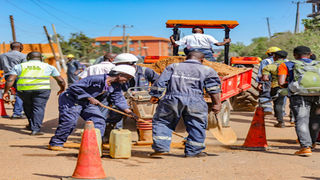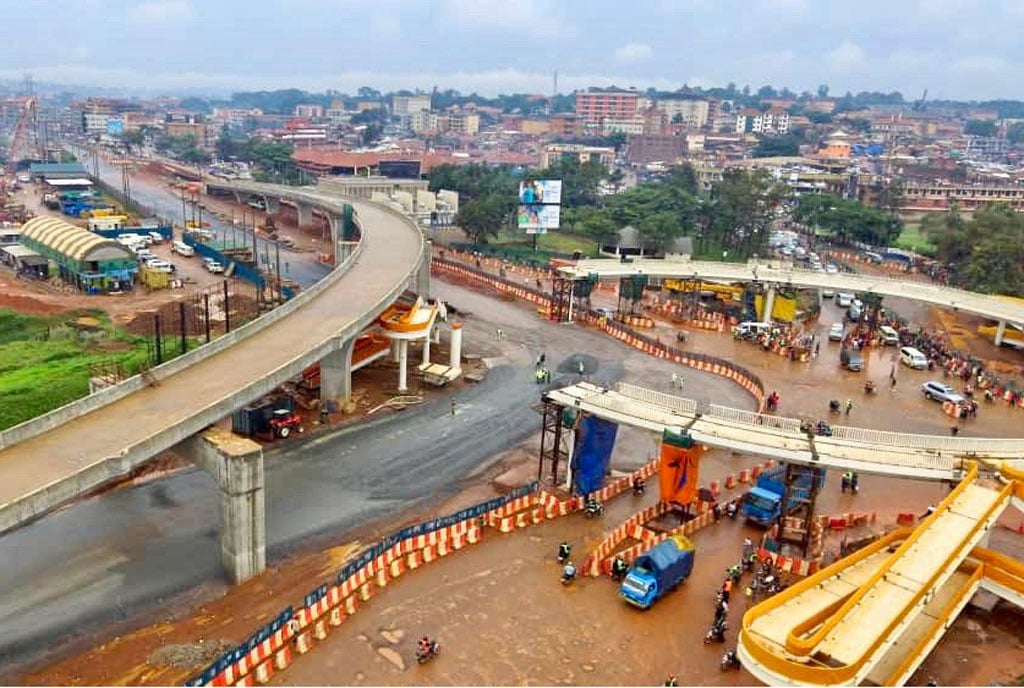
KCCA workers fill potholes on one of the roads in Kampala on January 4, 2022. KCCA says the works are temporary to make the roads motorable. PHOTO/KCCA
|National
Prime
Tracing Shs1 trillion loan for 29 roads in Kampala
What you need to know:
- MPs argue that KCCA should be reconstructing the roads since funding was provided by government.
Lawmakers have asked leaders of Kampala City to account for a $288 million (about Shs1 trillion) loan the government secured from African Development Bank (AFDB) to reconstruct 29 roads in the city.
Deputy Speaker Thomas Tayebwa, who chaired the House last week, demanded to know why Kampala Capital City Authority (KCCA) had embarked on patching up potholes when government through Parliament had secured funds for reconstructing the roads in Kampala City.
Mr Tayebwa, backed by lawmakers across the political spectrum, demanded accountability of the $288m loan the 10th Parliament passed about two years ago and was meant to facilitate reconstruction of 29 roads and other road infrastructure.
He also tasked the Minister of Kampala and Metropolitan Affairs, Ms Minsa Kabanda, and the KCCA executive director, Ms Dorothy Kisaka, to explain why potholes continue to exist on most city roads, instead of putting Shs1.06 trillion to use.
Asked to account for the roads money, Ms Kisaka explained in an interview with Daily Monitor on Monday that of the $288m, $246.90 million was allocated to construction projects and associated civil works in the city.
“KCCA will construct 69.70km of roads, which is equivalent of 83.7km single carriageways since some of the road sections will be dual carriage ways complete with associated drainage works, including improvement to 22 traffic junctions, 123 non-motorised transport facilities such as Luwum Street, commercial vehicles parking places, bus depots, 30 public toilets, six markets on project roads for women vendor, installation of 1,600 energy efficient street lights and landscaping with tree planting,” she said.
She reiterated that $14.95 million will be spent on project management such as paying consultants, conducting technical project audits, including monitoring and evaluation,and public transport technical assistance.
A total of $3.6 million will cater for institutional capacity building, $250,000 will go to women and youth skills empowerment and at least $11 million will be spent on project compensation and resettlement.
Ms Kisaka added: “The period, 2021 to 2022, has been utilised for the protracted and competitive procurement processes. This involved international bidding, bid submission, evaluation committees, best evaluated bidder notice, contracts Committee approval, and finally, the legal approval from the Solicitor General. KCCA got clearance for the project from the Attorney General’s chambers in July 2022,”
Under the plan, the disbursement of the money for the project, according to officials at KCCA, will be handled directly by the Ministry of Finance on behalf of the government and the lending bank.
ALSO READ: Crisis looms as debt hits Shs80 trillion
Monitor understands that the contractors for the various road projects are now in the mobilisation stage, getting set to commence the civil works.
“There is no need for alarm, this project started in 2016 and is ready for delivery to the city. It has been a six-year pregnancy. The NRM Manifesto promises to deliver 100km of roads in the city by 2026. We are on course, and this is one of the key projects that will deliver the NRM Manifesto,” Ms Kisaka said, adding that the decisions of the project from inception to delivery are inclusive of the various government ministries, departments, and agencies such as the Finance, Works and the Attorney General.
Ministry of Finance officials told Monitor that the African Development Bank, which has given the government the loan, has provided approvals of the scope of the works, the design of the project, and the selection of contractors.
Without disclosing specifics, the KCCA executive director told Monitor that the political leaders have provided oversight to the technical leaders since the time of project initiation in 2016.
She reiterated that all the figures were reflected in the budgets for 2021/2022 and 2022/2023 financial years. “Government processes are public and the legislative arm of the city,” Ms Kisaka said.
Parliament approved the loan in 2020 after considering the economic benefits to the city and the stock of the roads to be covered.
“That is 69.70 KM of roads. Some of the roads will be dual carriageway, thus increasing the length by 14km, complete with associated drainage works 22 traffic junctions. In addition, there will be 123km of non-motorised transport facilities such as Luwum Street,” Ms Kisaka said.
She aso revealed that in May 2021, the Ministry of Finance signed off the financing agreement with the pre-set terms and conditions, including road costing for five lots of roads in different divisions. The total funding for the project is $288 million.
She explained that the period 2021 to 2022 has been utilised for the protracted and competitive procurement processes and that KCCA got clearance for the project from Attorney General’s chambers in July 2022.
Project adjustments
In 2021, Ms Kisaka explained that the project was reviewed to eliminate the eco buses and instead add an additional stock of roads.
A total of $12 million that had been earmarked for the provision of eco buses was converted to the construction of additional roads that serve the city. These are Mpererwe – Kiteezi –Kiti road, Ntinda-Kampala Northern Bypass and Old Kira Road, effectively increasing the total length by 16.37km.
However, in actual analysis, other officials at City Hall revealed that 69.7 plus 14km of dual carriage and 16.37km of project adjustment make a total of 100km.
Planned projects
Some of the road sections will be dual carriageways, thus increasing the length by 14km, complete with associated drainage works and 22 traffic junctions. In addition, there will be 123km of non-motorised transport facilities.
“We shall have commercial vehicles parking places, bus depots, 30 public toilets, six markets along project roads for women vendors, installation of 1,600 energy efficient streetlights, and landscaping with tree planting,” Ms Kisaka said.




